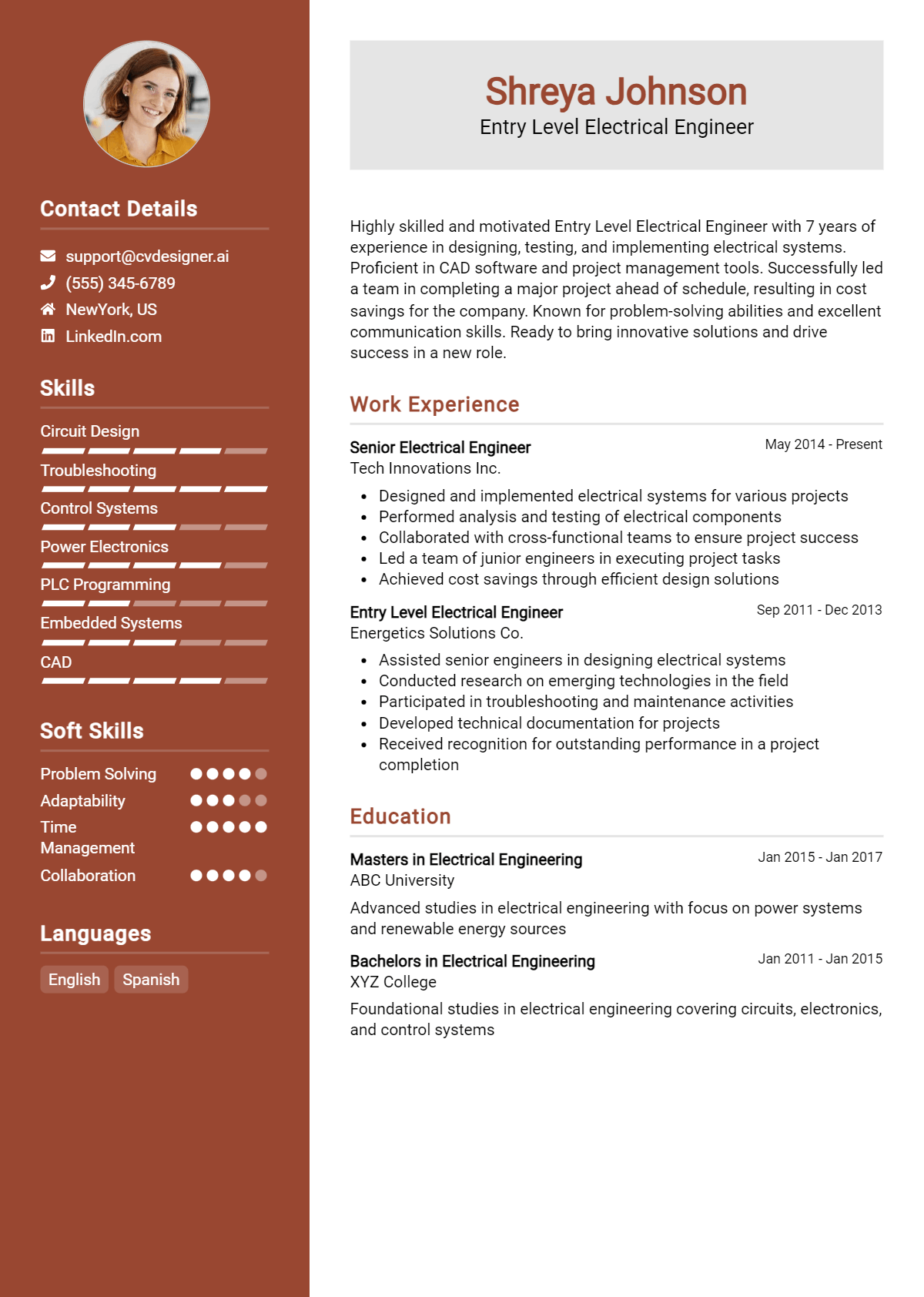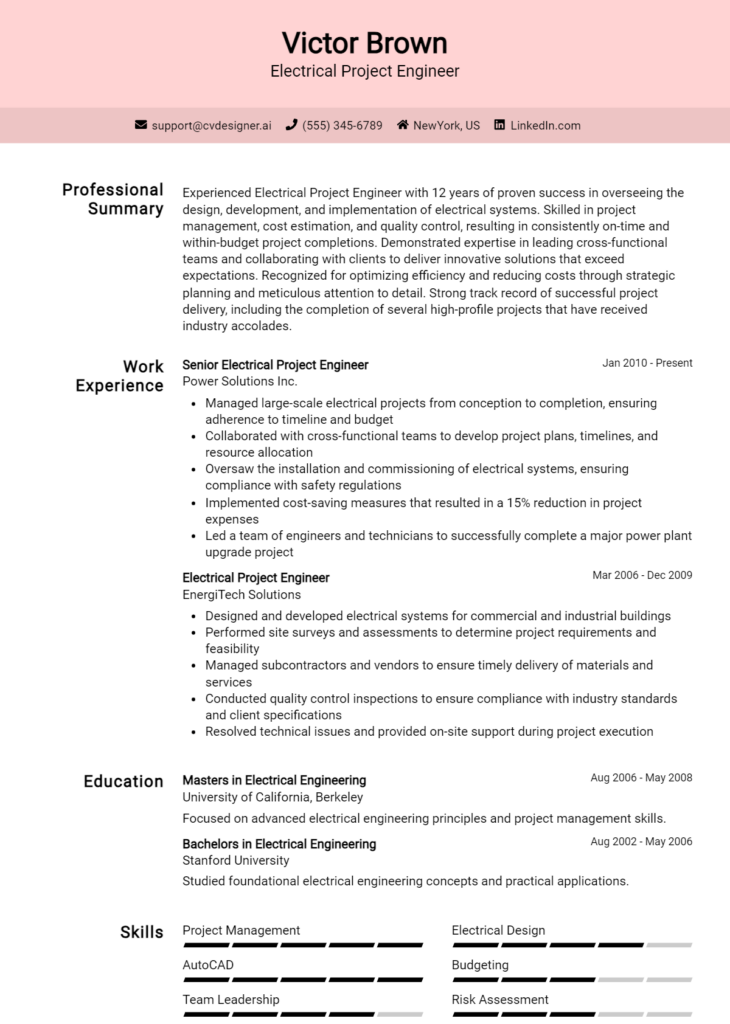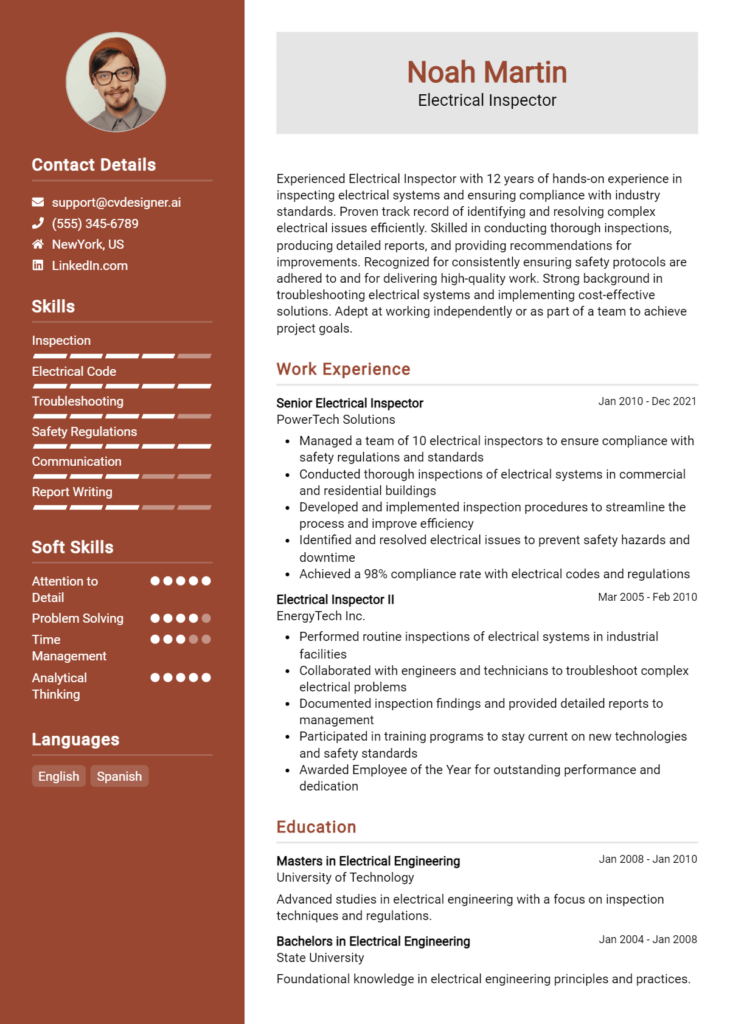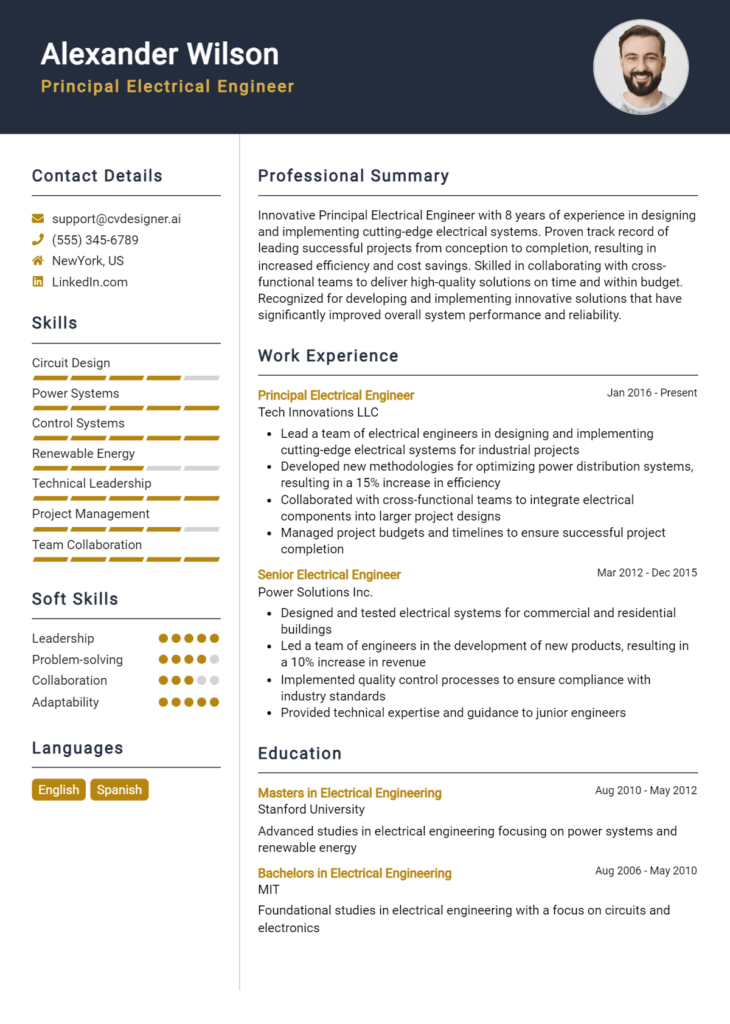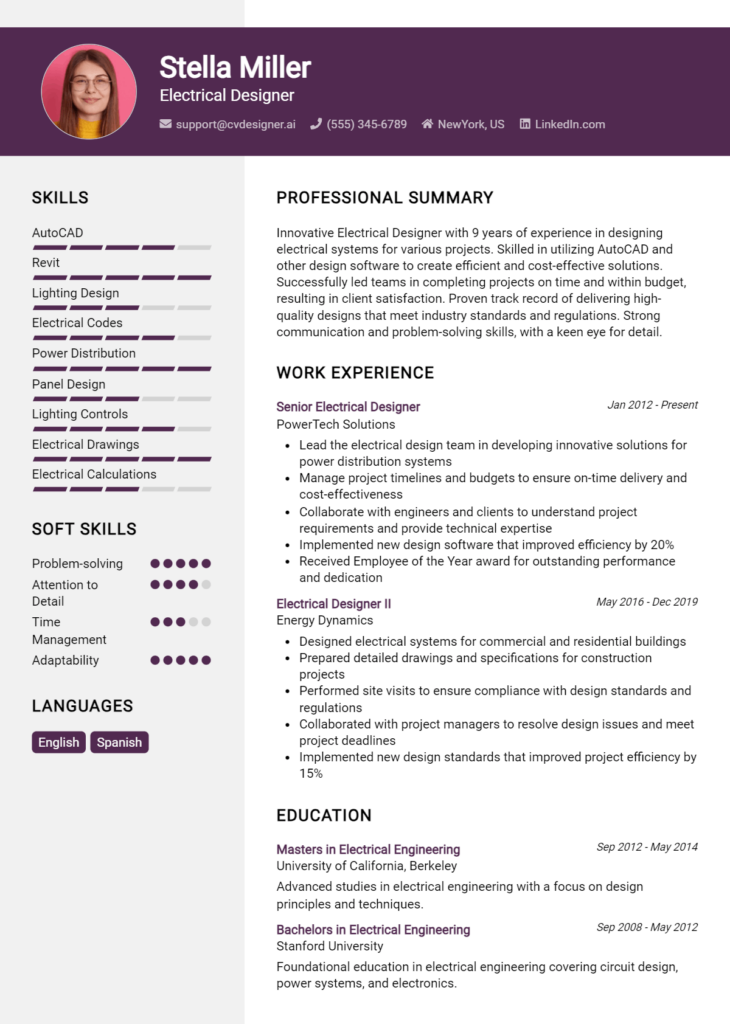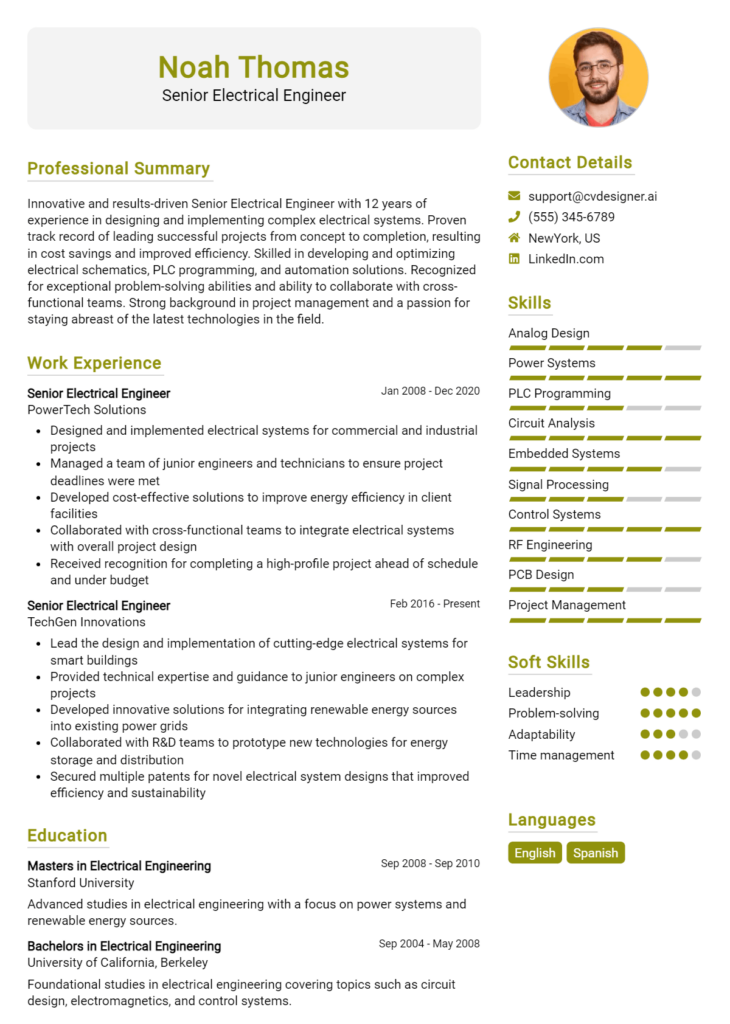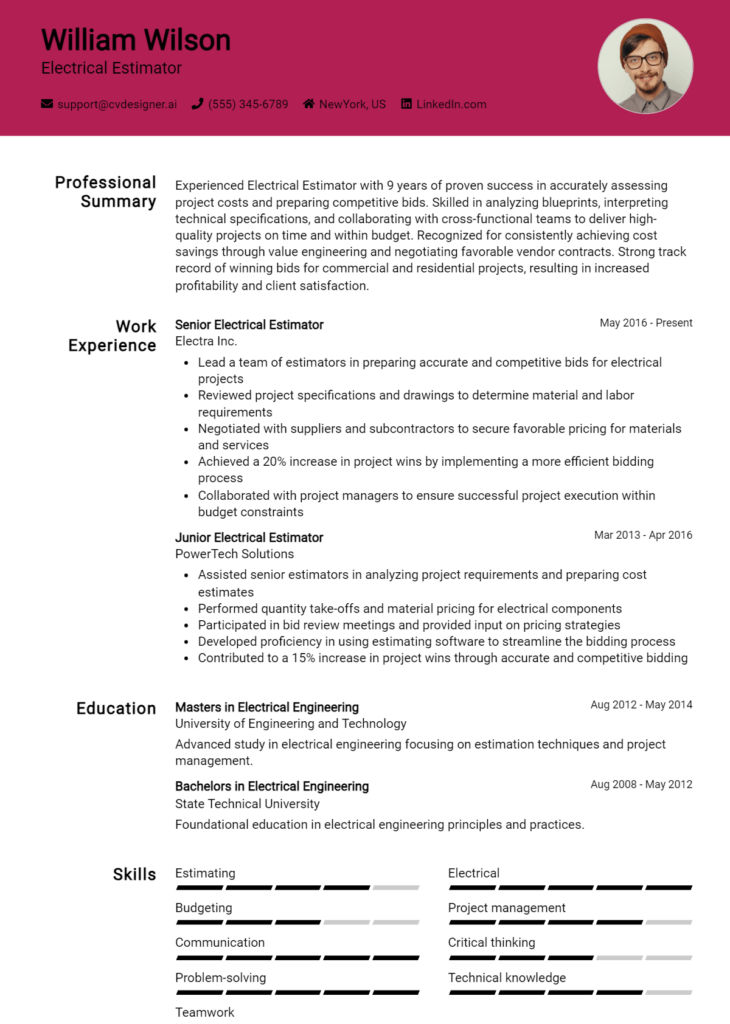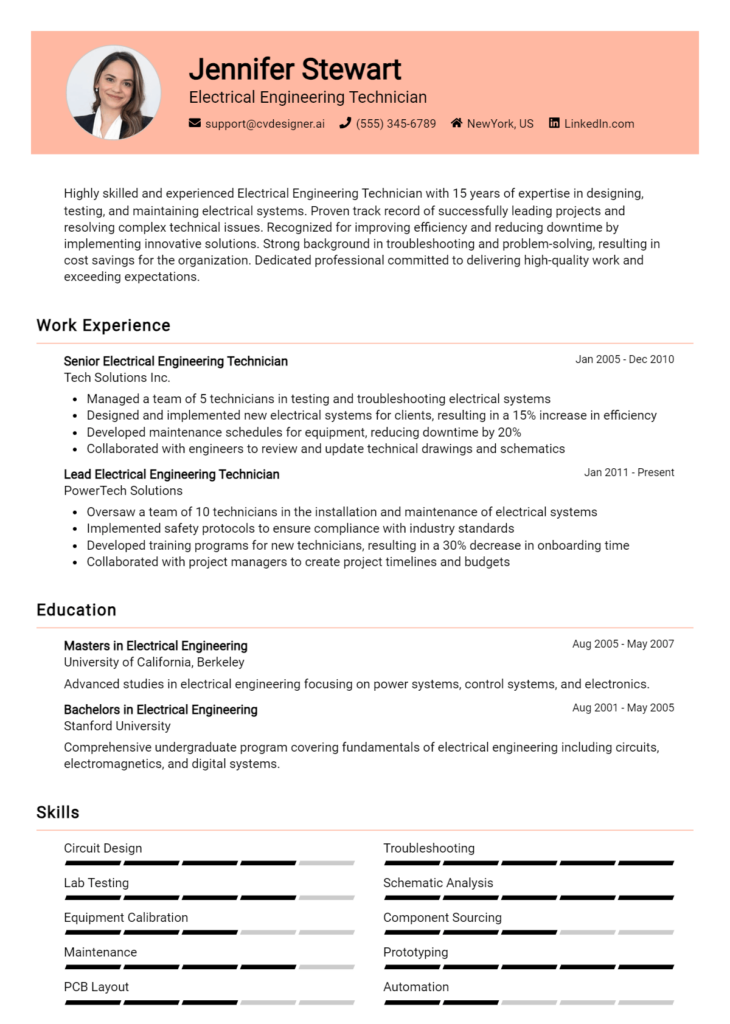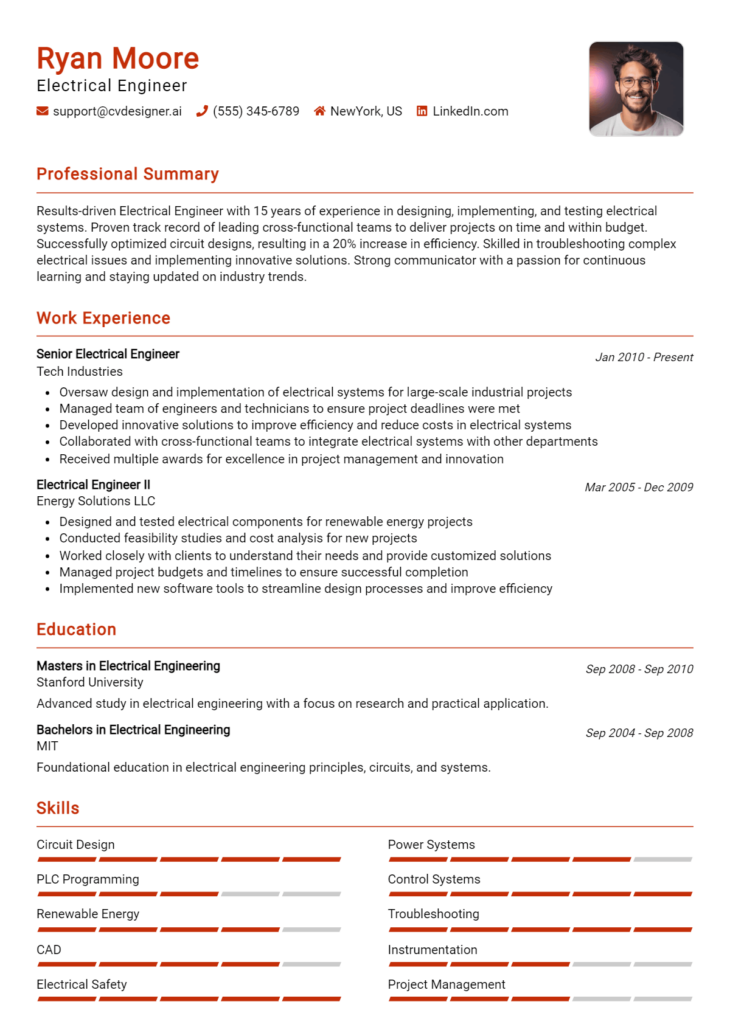Most Popular Entry Level Electrical Engineer Resume Examples
Explore additional Entry Level Electrical Engineer resume samples and guides and see what works for your level of experience or role.
As an entry-level electrical engineer, you stand at the threshold of an exciting and dynamic career filled with opportunities to innovate and contribute to groundbreaking projects. This pivotal role not only demands a solid foundation in engineering principles but also requires you to effectively communicate your skills and experiences through a well-crafted resume. In a competitive job market, a standout resume can be the key to securing interviews and showcasing your potential to prospective employers. By investing time in creating a compelling resume, you enhance your chances of making a lasting impression and kickstarting your career in the electrical engineering field.
In this resume writing guide, we will delve into the essential components of an effective entry-level electrical engineer resume. We will cover the core responsibilities and skills that hiring managers look for, as well as the best formats to use to present your qualifications. You'll learn about common mistakes to avoid that could hinder your chances of landing that crucial interview. Additionally, we will provide resume examples tailored for all experience levels and offer invaluable tips on crafting a resume that stands out. Furthermore, we will guide you in selecting the right resume templates to suit your style and the industry standards. Whether you’re fresh out of college or transitioning from another field, this guide will equip you with the knowledge and tools needed to create a winning resume.
Key Responsibilities and Skills for a Entry Level Electrical Engineer
As an Entry Level Electrical Engineer, you will be responsible for supporting various engineering projects and tasks under the guidance of senior engineers. Your role will typically involve the design, development, testing, and maintenance of electrical systems and components. Here are some of the key responsibilities you can expect:
- Assisting in the design and development of electrical circuits and systems.
- Conducting tests and evaluations of electrical equipment and components.
- Participating in troubleshooting and resolving electrical issues.
- Collaborating with team members on project planning and implementation.
- Preparing technical reports and documentation.
- Ensuring compliance with safety and industry standards.
- Utilizing computer-aided design (CAD) software for project visualization.
Essential skills required for this position include:
- Strong understanding of electrical principles and concepts.
- Proficiency in CAD software and other engineering tools.
- Analytical problem-solving abilities.
- Basic knowledge of circuit design and analysis.
- Excellent communication and teamwork skills.
- Attention to detail and strong organizational skills.
- Familiarity with industry regulations and safety standards.
Highlighting these skills effectively in your resume skills section is crucial for making a strong impression on potential employers. Tailoring your listed responsibilities and skills to align with the specific job description can significantly enhance your chances of securing an interview. Consider how these skills could be relevant in creating a strong CV, emphasizing relevant coursework, internships, or projects that showcase your proficiency and enthusiasm for electrical engineering.
Best Resume Format and Structure for a Entry Level Electrical Engineer
When crafting a resume for an Entry Level Electrical Engineer position, it's essential to choose a format that highlights your qualifications effectively. Below is a guide to the best resume structure and format to follow, as well as tips on what to include in each section.
Contact Information
- Name: Use a larger font size to make your name stand out.
- Phone Number: Ensure your voicemail is professional since employers may reach out to you.
- Email Address: Use a professional email address (ideally, a combination of your name).
- LinkedIn Profile: Include a link to your LinkedIn profile if it is updated with relevant information.
- Location: City and state are sufficient; you don’t need to include your full address.
Professional Summary
- Write a brief summary (2-3 sentences) that captures your background, skills, and what you bring to the role.
- Focus on your educational qualifications, any relevant internships, and your passion for electrical engineering.
- Tailor this section to align with the job description you are applying for.
Work Experience
- Internships: If you have relevant internship experience, list them here, including your role, the company's name, and the dates of employment.
- Projects: Include any significant academic projects or group work where you applied electrical engineering principles. Be specific about your contributions and the tools or technologies used.
- Use bullet points to list your responsibilities and achievements. Start each bullet with a strong action verb and quantify results when possible (e.g., "Designed a circuit that improved energy efficiency by 10%").
Education
- List your degree(s) in reverse chronological order (most recent first).
- Include the name of the institution, degree earned, and graduation date.
- If you have a strong GPA (generally 3.0 or above), you may choose to include it.
- Mention relevant coursework, honors, or awards that showcase your abilities.
Skills
- Create a section that highlights both technical and soft skills relevant to the electrical engineering field.
- Technical skills may include software (e.g., MATLAB, AutoCAD, PSpice), programming languages (e.g., C++, Python), and engineering principles (e.g., circuit design, signal processing).
- Soft skills might include problem-solving, teamwork, and communication abilities.
Certifications
- List any relevant certifications you have obtained (e.g., EIT certification, OSHA safety certification).
- Include the name of the certification, the issuing organization, and the date obtained.
Additional Sections (Optional)
- Professional Affiliations: Mention memberships in engineering societies (e.g., IEEE, NSBE).
- Volunteer Work: Highlight any volunteer experiences that demonstrate your teamwork and leadership skills.
Formatting Tips
- Use a clean, professional font (e.g., Arial, Calibri) and keep the font size between 10-12 points.
- Maintain consistent formatting for headings and bullet points.
- Limit your resume to one page; be concise and avoid unnecessary filler information.
- Use white space effectively to ensure the document is easy to read.
Complementing Your Resume with a Cover Letter
The resume format you choose should complement your cover letter. A well-structured cover letter should follow a similar layout and aesthetic, ensuring consistency. Start with a strong opening that introduces you and states the position you are applying for. Use the body of the letter to elaborate on your skills and experiences, linking them directly to the job requirements. End with a professional closing that invites further discussion.
By adhering to this structured resume format and following these guidelines, you’ll be well on your way to impressing potential employers in your search for an Entry Level Electrical Engineer position.
Writing Tips and Best Practices for a Entry Level Electrical Engineer Resume
When crafting a resume as an Entry Level Electrical Engineer, it’s crucial to present your skills and experiences in a clear, concise, and compelling manner. Highlight your education, internships, and relevant projects, focusing on how they relate to the role you're applying for. Utilize a professional format and ensure the document is easy to read, as this makes a strong first impression. Incorporating resume writing tips can enhance the overall look and effectiveness of your resume. Remember that the same principles apply when drafting your cover letter, allowing you to create a cohesive application package.
- Use action verbs to start bullet points, such as "designed," "developed," and "implemented," to convey your contributions effectively.
- Quantify achievements wherever possible; for instance, mention the percentage of efficiency improvement or the number of projects completed during your internship.
- Incorporate industry-specific keywords from the job description to ensure your resume passes through Applicant Tracking Systems (ATS) and resonates with hiring managers.
- Tailor your resume for each job application, emphasizing the most relevant experiences and skills that align with the specific role.
- Include relevant coursework, certifications, and technical skills, such as proficiency in software like AutoCAD or MATLAB, to showcase your technical competence.
- Keep your resume to one page, especially as an entry-level candidate, focusing on the most impactful information.
- Use a clean and professional layout, with consistent fonts and spacing, to enhance readability and visual appeal.
- Proofread thoroughly to eliminate any grammatical or typographical errors, as these can detract from your professionalism.
Common Mistakes to Avoid in a Entry Level Electrical Engineer Resume
Crafting an effective resume as an entry-level electrical engineer can be challenging, and it's essential to avoid common pitfalls that can diminish your chances of landing an interview. A well-structured resume not only showcases your skills and qualifications but also reflects your attention to detail and professionalism. Here are some common mistakes to steer clear of:
- Overloading your resume with excessive information or irrelevant details.
- Using generic descriptions that fail to highlight your unique skills and experiences.
- Failing to tailor your resume for specific job applications, resulting in a lack of focus.
- Neglecting to quantify achievements, making it harder for employers to gauge your impact.
- Using an unprofessional email address or contact information.
- Skipping keywords from the job description, which may result in your resume being overlooked by applicant tracking systems.
- Ignoring formatting consistency, which can make your resume look cluttered or busy.
- Including outdated or unnecessary information, such as high school details if you have a college degree.
- Making grammatical errors or typos that can undermine your credibility.
- Not including relevant coursework or projects that demonstrate your technical skills.
To enhance your resume and avoid these common errors, consider reviewing the common mistakes to avoid in a resume. Additionally, don't overlook the importance of your cover letter; check out the common cover letter mistakes to ensure your application package is comprehensive and compelling.
Sample Entry Level Electrical Engineer Resumes
As an entry-level electrical engineer, crafting a compelling resume is essential to stand out in a competitive job market. Below are three sample resumes to guide you in showcasing your skills and experience effectively. Each example caters to different backgrounds: an experienced professional, an entry-level candidate, and a career changer. These templates can serve as a foundation for your resume, helping you highlight your unique qualifications. For more inspiration, consider exploring additional resume templates. Additionally, incorporating a well-crafted cover letter can enhance your job application package.
Sample Resume 1: Experienced Professional
[Your Name]
[Your Address]
[City, State, Zip]
[Your Phone Number]
[Your Email]
Objective
Results-driven electrical engineer with over 5 years of experience in designing and implementing electrical systems. Proven ability to manage projects, collaborate with cross-functional teams, and enhance system efficiencies. Seeking to leverage expertise in a challenging new role.
Education
Bachelor of Science in Electrical Engineering
University of XYZ, City, State
Graduated: May 2018
Professional Experience
Electrical Engineer
ABC Engineering Solutions, City, State
June 2018 – Present
- Designed and implemented electrical systems for commercial and residential projects, achieving a 15% reduction in energy costs.
- Collaborated with project managers and other engineers to ensure compliance with safety standards and regulations.
- Conducted system simulations and testing, leading to optimized performance and reliability.
Intern
XYZ Electric Company, City, State
January 2018 – May 2018
- Assisted in the development of electrical schematics and layouts for client projects.
- Gained hands-on experience with CAD software and circuit design tools.
Skills
- Circuit Design
- Project Management
- AutoCAD, MATLAB, PSpice
- Team Collaboration
- Problem Solving
Certifications
- EIT (Engineer in Training) Certification
- OSHA Safety Certification
Sample Resume 2: Entry-Level Candidate
[Your Name]
[Your Address]
[City, State, Zip]
[Your Phone Number]
[Your Email]
Objective
Motivated and detail-oriented recent graduate with a Bachelor’s degree in Electrical Engineering. Eager to apply academic knowledge and hands-on experience in a dynamic engineering role. Committed to continuous learning and professional development.
Education
Bachelor of Science in Electrical Engineering
University of XYZ, City, State
Graduated: May 2023
Relevant Experience
Electrical Engineering Intern
DEF Tech Solutions, City, State
June 2022 – August 2022
- Assisted in the design and testing of circuit boards for various electronic products.
- Collaborated on a team to troubleshoot and resolve technical issues, enhancing product performance.
Capstone Project
University of XYZ
August 2022 – May 2023
- Led a team project to design an energy-efficient lighting system using renewable energy sources.
- Conducted simulations and analysis, resulting in a system with a projected 30% energy savings.
Skills
- Circuit Analysis
- Proficient in AutoCAD and MATLAB
- Strong Analytical Skills
- Team Player
- Excellent Communication Skills
Certifications
- EIT (Engineer in Training) Certification (Expected: December 2023)
Sample Resume 3: Career Changer
[Your Name]
[Your Address]
[City, State, Zip]
[Your Phone Number]
[Your Email]
Objective
Dedicated professional with 3 years of experience in software development seeking to transition to electrical engineering. Possesses a strong foundation in technical problem solving and project management, with a passion for designing innovative electrical systems.
Education
Bachelor of Science in Electrical Engineering
University of XYZ, City, State
Graduated: May 2023
Relevant Experience
Software Developer
GHI Technologies, City, State
June 2020 – Present
- Developed software solutions that improved operational efficiency by 20%.
- Collaborated with engineering teams to integrate software with hardware components.
Technical Projects
University of XYZ
January 2023 – May 2023
- Designed and built a prototype for a smart home automation system, integrating various electrical components and programming software.
- Conducted testing and debugging, ensuring reliability and functionality of the system.
Skills
- Software Development (Python, C++)
- Electrical Circuit Design
- Project Management
- Strong Problem-Solving Skills
- Effective Communication
Certifications
- EIT (Engineer in Training) Certification (Expected: December 2023)
These sample resumes illustrate different paths to entering the field of electrical engineering. Tailor your resume to reflect your personal experiences and strengths, ensuring it aligns with the job you are applying for. Don't forget to complement your resume with a strong cover letter, which you can find examples of here.
Checklist for a Entry Level Electrical Engineer Resume
- Proofread for Typos and Errors: Carefully review your resume for any spelling, grammatical, or typographical errors. Consider using tools like spell check or grammar check for assistance.
- Check Formatting Consistency: Ensure that fonts, sizes, bullet points, and spacing are consistent throughout the document. This helps create a professional appearance.
- Tailor Content to the Job Description: Customize your resume for each application by highlighting relevant skills and experiences that match the specific requirements of the job posting.
- Use Action Verbs: Start bullet points with strong action verbs (e.g., designed, developed, analyzed) to convey your accomplishments and responsibilities effectively.
- Include Relevant Coursework and Projects: Highlight any coursework, projects, or internships that are directly related to electrical engineering to demonstrate your practical knowledge and skills.
- Quantify Achievements: Whenever possible, include numbers or metrics to quantify your achievements (e.g., "Improved efficiency by 20% in a project").
- Ensure Contact Information is Up-to-Date: Double-check that your phone number, email address, and LinkedIn profile (if applicable) are current and correctly formatted.
- Keep It Concise: Limit your resume to one page, focusing on the most relevant information that showcases your qualifications for the role.
- Seek Feedback: Have a mentor, professor, or peer review your resume to get constructive criticism and suggestions for improvement.
- Utilize an AI Resume Builder: Consider using an AI resume builder to ensure all elements are well-organized and visually appealing.
Similar checklists can also be followed for creating a CV or cover letter.
Key Takeaways for a Entry Level Electrical Engineer Resume Guide
As you prepare to craft your entry-level electrical engineer resume, remember that the examples and tips provided are not just guidelines, but essential tools to help you stand out in a competitive job market. By tailoring your resume to highlight relevant skills, experiences, and accomplishments, you can create a compelling narrative that showcases your potential and eagerness to contribute to the engineering field.
To take the next step, consider downloading a professional resume template from resume templates or a customized cover letter template from cover letter templates. Additionally, you can utilize our best resume maker to streamline the process and ensure your resume is polished and professional. Adhering to similar guidelines will not only enhance your resume but also aid in crafting a strong CV and an impactful cover letter. Start today, and take confident strides towards securing your dream position in electrical engineering!
